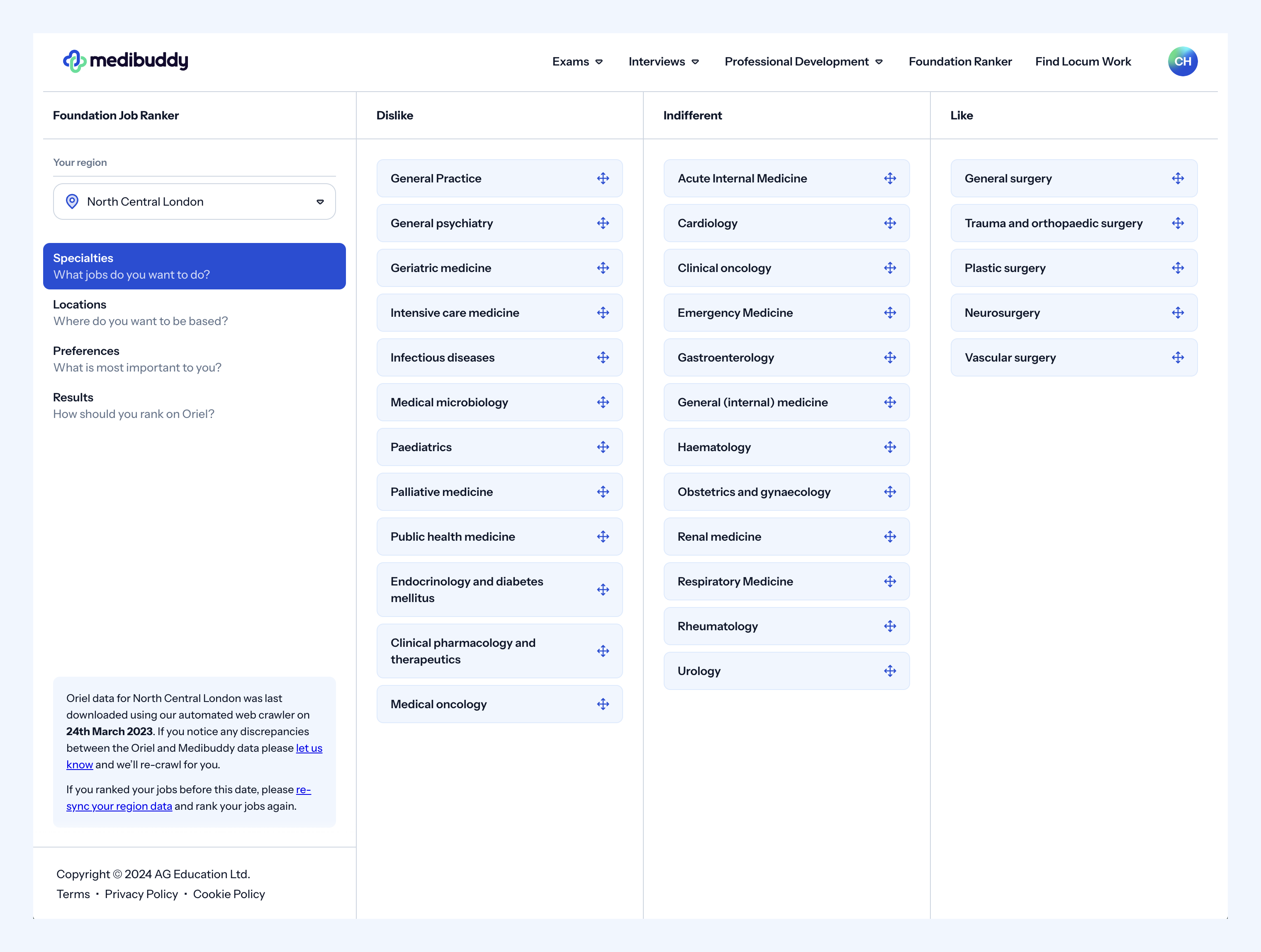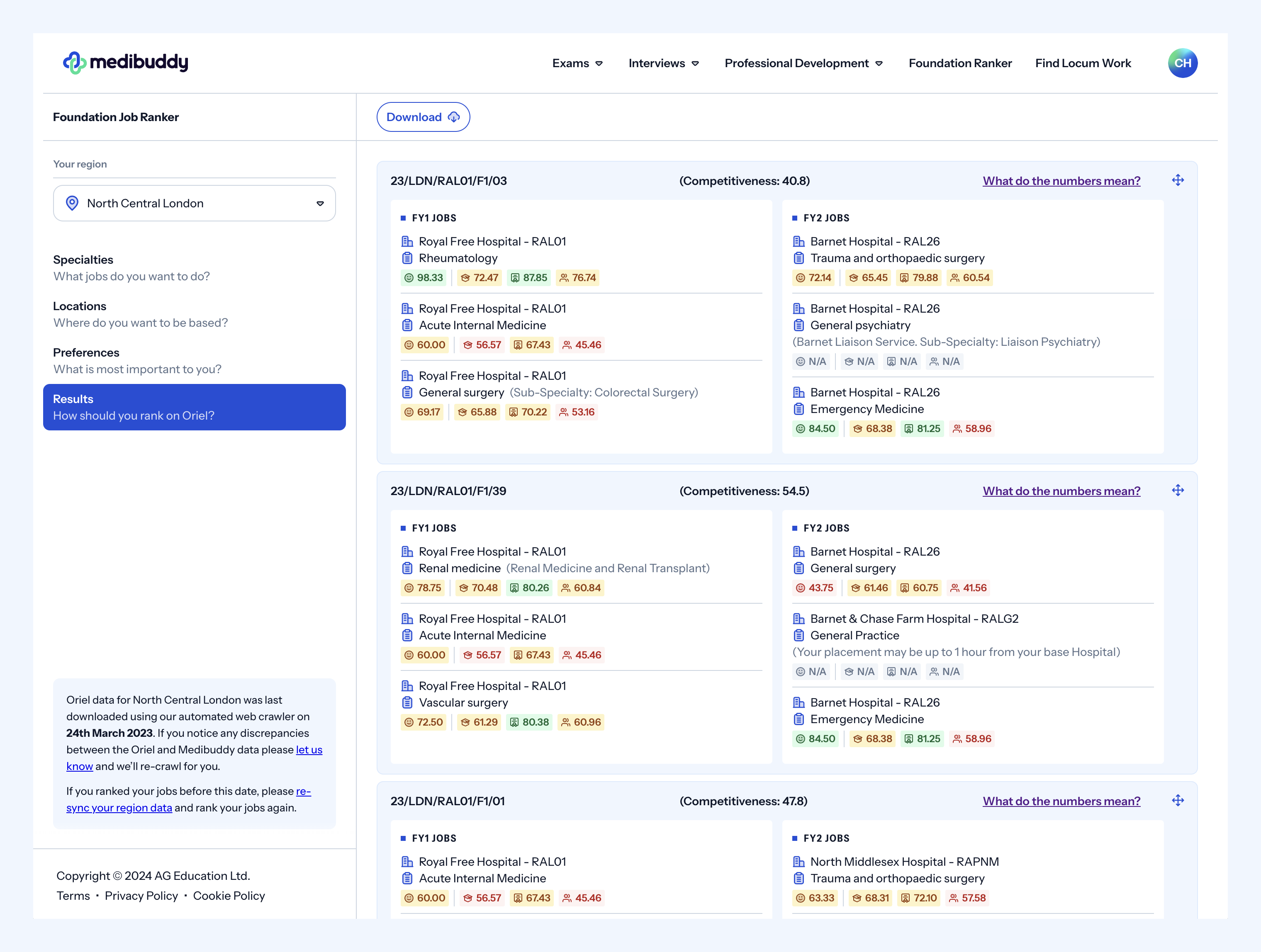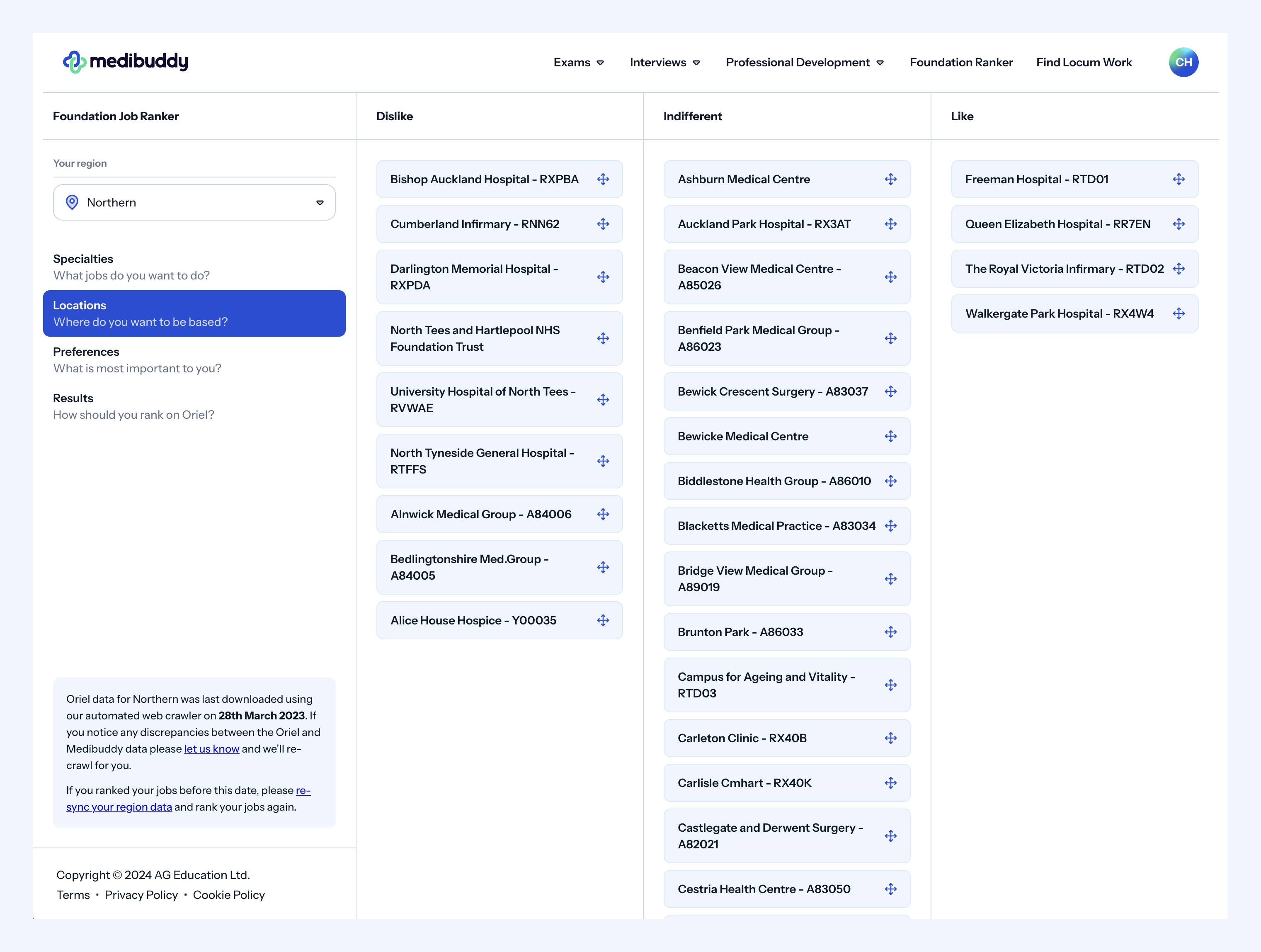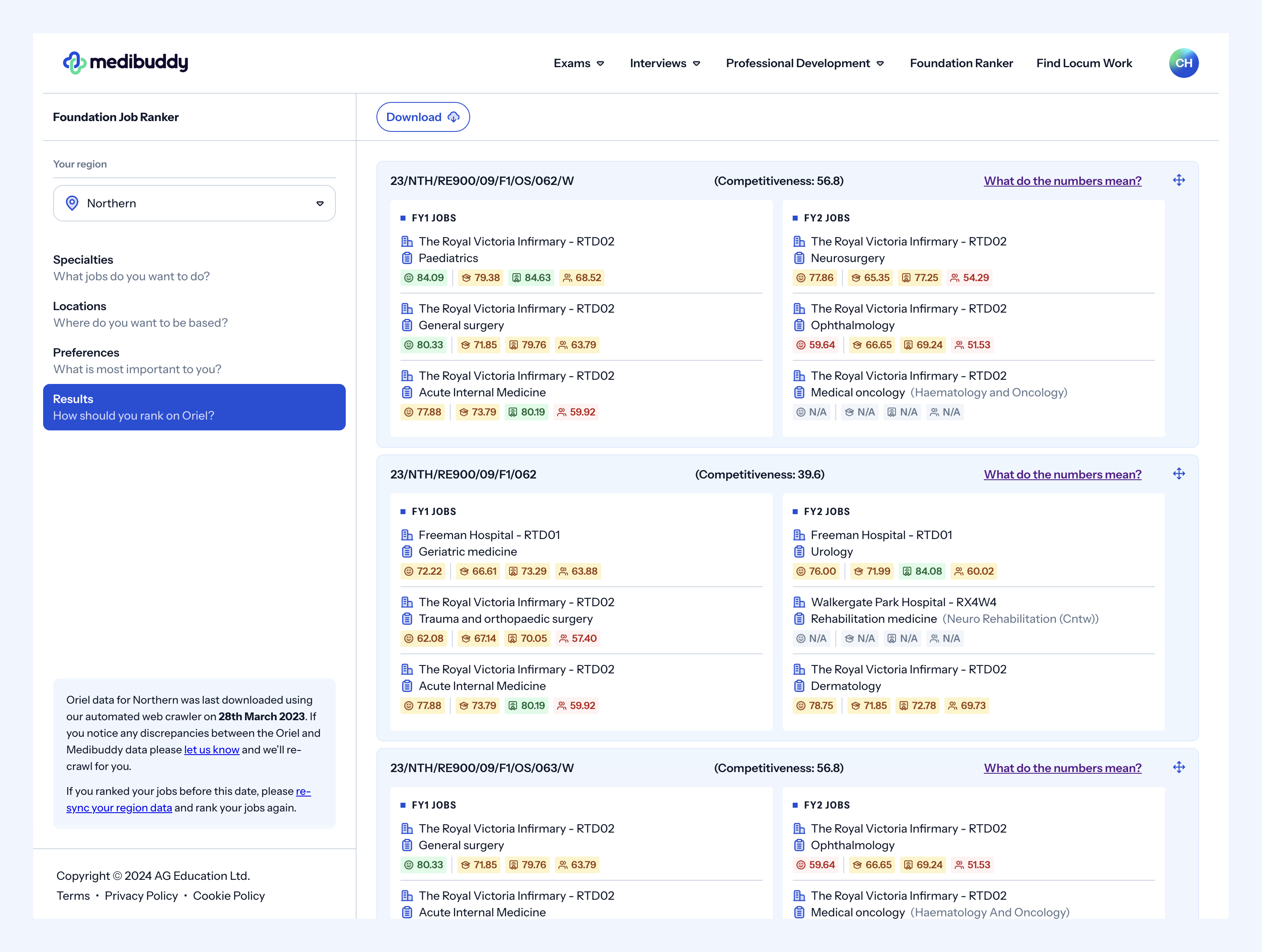
If you’re approaching the end of medical school, you might be starting to think about the UK foundation programme for 2025. This guide provides a handy overview of the UKFPO, how to apply and the UKFPO timeline (so you don’t miss any key dates!). You’ll also find information on other key areas relating to the UKFPO, including the specialist foundation programme (SFP), the foundation priority programme, psychiatry foundation fellowships and less than full time training (LTFT).
Please note: Recruitment to Specialised Foundation Programmes (SFP) is changing for 2025. You can find out more below.
Our new UKMLA question bank, designed specifically to match the exam syllabus, can help!
The UKMLA syllabus differs from old-style medical finals or the PLAB.
Ensure that any question bank provider you use hasn’t just changed the name of their old question bank. Medicine is vast, and you may waste considerable time revising topics not in the MLA.
All providers should be able to give you a breakdown of exactly how their question bank matches the UKMLA content map. Find ours here.
Following medical school, you’ll undertake the UKFPO – a 2-year, work-based training programme – which aims to develop your clinical and professional skills in the workplace. The UKFPO is a continuation of your medical education and aims to ensure that newly qualified doctors deliver safe and effective patient care. The UKFPO bridges the gap between medical school and specialty or general practice training.
You’ll be allocated your UKFPO role through a ranking process – you can find out more in the ‘how do I apply to foundation training?’ section below – but in short, you’ll first rank the foundation schools in order of your preference, before then ranking the jobs within your allocated foundation school. The ranking process can be time consuming and frustrating; you can find tips on how to make the whole process easier and quicker in our Foundation Job Ranking blog.
Through the UKFPO, you’ll complete a number of rotations in different medical and surgical specialties. These are designed to provide a balanced programme which allows you to meet the competencies and outcomes of the Foundation Programme (FP) curriculum set by the GMC.
The UKFPO is split into Foundation Year 1 (FY1) and Foundation Year 2 (FY2). Usually, you’ll undertake three rotations each year, but this does vary depending on your role. Regardless of rotations, FY1 and FY2 provide the following opportunities and outcomes:
Through undertaking supervised responsibility for patient care, you’ll consolidate your skills from medical school within the workplace. Following successful completion of FY1, you’ll be awarded a Foundation Year 1 Certificate of Completion (FY1CC) and recommended to the GMC for full registration. You can find out more about full registration here.
Although you’ll still be supervised, you’ll have greater responsibility for patient care, and begin to make management decisions as you progress towards independent practice. You’ll also contribute to the learning and development of the wider healthcare team, including nurses, medical students and less experienced doctors.
On successful completion of FY2, you’ll be awarded a Foundation Programme Certificate of Completion (FPCC). This indicates that you are beginning to demonstrate clinical effectiveness, leadership and decision making skills, which are essential for core, specialty or general practice training, and therefore are ready to begin one of these training programmes.
To apply for the UKFPO, you must register on Oriel and apply through the national FP vacancy during the national application window (see timeline below). You need to complete the national application form, which includes your foundation school preferences.
Once you have applied and submitted your foundation school preferences, you’ll be allocated a foundation school. You can find more information about foundation school preferences, including how to choose a foundation school and how these are allocated, in our Foundation Job Ranking blog.
Within your foundation school, you’ll then need to rank the jobs in order of preference.
Ranking your job preferences can be a difficult and lengthy task, and as it’ll determine which UKFPO role you’ll undertake and where you spend the next two years, it’s not one you want to undertake lightly. The simplest approach is to decide what is more important to you in terms of location and/or specialty and use this to order your jobs accordingly. For example, the applicant below prioritised the job specialties over the location and was interested in surgery.

Using the Medibuddy foundation job ranker, they placed any surgery related specialties in the ‘like’ column. Any specialties they didn’t want or would rank low – such as General Practice and Psychiatry – they placed in the ‘dislike’ column, and any other specialties they put in the ‘indifferent’ column. Using this information, the available jobs in their foundation school were then automatically ordered to match their specialty preferences.

This would then be used to rank their jobs easily and effectively in Oriel.
Note: before you can register and apply on Oriel, you first need to be ‘nominated’, either by your medical school or the UKFPO’s Eligibility Office. You can find out more here.
Oriel is the national online application system for medical training in the UK. You complete all aspects of applying for the UKFPO in Oriel.
The Medibuddy foundation job ranker downloads the foundation jobs for your allocated foundation school directly from Oriel. This ensures that the job list in the foundation job ranker is identical to Oriel, making it simple for you to rank your choices easily in our system, before transferring them to Oriel.
For more information on how you rank your programme preferences in Oriel visit our Foundation Job Ranking blog.
The recruitment process for Specialised Foundation Programmes is changing. In 2025, all applications to SFP will be incorporated into the main Foundation School allocation process.
This change is being implemented because of concerns about the need for more resources to support the recruitment, interview, and selection process at a local level. The intention is to create fairer and more consistent recruitment across the UK.
Preference Informed Allocation (PIA) was introduced for the UK FP allocation process in 2024.
The allocation model gives all applicants a computer-generated rank. This is designed to provide as many applicants as possible their first choice preference.
The allocation algorithm on Oriel will work through the list of applicants in computer-generated rank order to assign as many applicants as possible to their first choice, before allocating applications to their next available choice.
This process will be used to allocate foundation schools and then foundation programmes. The same rank will be used for each.
You can learn more about the PIA process here.
Previously, your Foundation Programme Application System (FPAS) points would be used when matching you with your ranked foundation school and foundation jobs.
Your FPAS points were a combination of your Educational Performance Measure (EPM) and your Situational Judgement (SJT) score. However, after introducing the PIA system for 2024 entry, the SJT and EPM have been removed from the process. This means you will no longer need to take the SJT as part of the FP application.
Starting from 2025, the UK Foundation Programme (UKFP) is implementing changes to the application process for eligibility route applicants. You’ll no longer need to submit a Dean’s Statement. Instead, you must provide evidence of your primary medical qualification (PMQ) through one of the following methods:
To evidence your English language proficiency for UKFP 2025, you have three options:
A PMQ is accepted as evidence of English language proficiency if obtained from a medical school in a country where English is the first language.
Some important notes to be aware of:
For UKFP 2025, only the Academic and UKVI (Academic) versions of the IELTS test will be accepted. The minimum required standard remains a score of 7.5 in each skill (speaking, listening, reading, and writing) on the same Test Report Form (TRF). Tests must be dated no earlier than 06 August 2023.
IELTS One Skill Retake: The UKFPO accepts the IELTS One Skill Retake option, provided the final result can be verified on the IELTS verification portal.
The requirements for OET certificates remain unchanged. Applicants must score 400 in each skill in a single test sitting, and the tests must also be dated no earlier than 06 August 2023.
If your primary medical qualification (PMQ) appears on the GMC’s list of accepted overseas medical qualifications, you have an additional eligibility condition to meet. You must submit evidence as a letter or email, which the UKFPO will then review on a case-by-case basis.
The deadline to submit this evidence is 06 September 2024. You must provide sufficient evidence by this deadline to ensure your application is accepted.
To Secure your UKFPO role, the key things you must do are:

Using these preferences, the foundation job ranker simply arranged the available jobs to ensure that those close to the applicant’s home address were ranked first.

As you can see, jobs at the RVI, Freeman Hospital and Walkergate Park Hospital have been prioritised, meaning they can now use this to rank their jobs in Oriel easily and quickly.
The following are the only dates that have been released for the UKFPO 2025 so far:
| Recruitment Activity | Dates |
|---|---|
| Eligibility application window | 3 – 23 July 2024 |
| Oriel registration opens | 17 September 2024 (09:00 BST) |
| National application window | 25 September 2024 – 9 October 2024 |
| Deadline to rank and amend Foundation School/UoA preferences for FP on Oriel | 12 February 2025 (12:00 midday GMT) |
We’ll continue to update this as more 2025 dates are published. Once released, you can also find a full breakdown of all dates relating to the UKFPO 2025, including when guidance is published and pre-allocation dates, here .
To give you an idea of when each stage is likely to be, we’ve included the 2024 dates below:
| Recruitment Activity | Dates |
|---|---|
| Eligibility application window | 4 – 25 July 2023 |
| Oriel registration opens | 12 September 2023 (09:00 BST) |
| National application window | 20 September 2023 (09:00 BST) – 4 October 2023 (12:00 midday BST) |
| Deadline to rank and amend Foundation School/UoA preferences for FP on Oriel | 14 February 2024 (12:00 midday GMT) |
| Allocation to Foundation School | 7 March 2024 |
| Reference submission window opens | 7 March – 12 July 2024 |
| Programme preferencing window (1-stage process) | 7 – 27 March 2024 (12:00 midday GMT) |
| Group preferencing window (2-stage process) | 7 – 13 March 2024 (12:00 midday GMT) |
| Group match results released | 18 March 2024 |
| Programme preferencing window (2-stage process) | 18 – 27 March 2024 (12:00 midday GMT) |
| Programme match results released to applicants | 11 April 2024 |
As a foundation doctor, the specialist foundation programme (SFP) provides you with the opportunity to develop your research, teaching and leadership skills, in addition to achieving the FP curriculum competencies.
The foundation priority programme (FPP) is designed to attract and retain doctors in specific areas of the UK, including remote, rural and coastal geographies, under-doctored geographies and shortage specialities. They offer a range of incentives, such as financial benefits, unique teaching and leadership opportunities and specialty experiences.
Note: It has been announced that from 2025, applications to SFP will be incorporated into the main FP allocation process. This is relevant to applicants applying to NHS England, NHS Education for Scotland, and the Northern Ireland Medical and Dental Training Agency. This process already applies for Wales.
You can find out more about the changing application process for 2025 here .
Whilst applying for the UKFPO, you’ll have the option to indicate on your application form if you would like to train on a less than full time basis. Once you have been allocated a foundation school, it is recommended that you discuss this with them. When it comes to ranking the jobs within your foundation school, you should only rank jobs you wish to be considered for – those offering less than full time working – and any you would not accept should be listed in the ‘not wanted’ column.
For more information on how to effectively rank the foundation jobs – whether you’re applying for LTFT or not – visit our Foundation Job Ranking blog. Or, if you’ve already got a region in mind, you can take a look at the various jobs that were available in 2024 using our Foundation Job Ranker (we’ll be updating with the 2025 jobs when Oriel releases them).
Ranking your foundation jobs can be a stressful and time consuming process. The